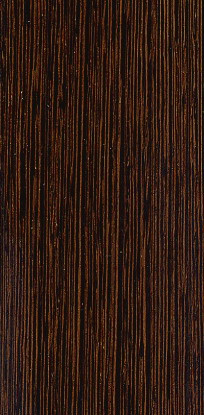

The tropical essence Wenge, native to West and Central Africa, is a sought-after wood in cabinet making and flooring, thanks to its aesthetic qualities, but also because of its durability. Its resistance to termites, fungi and borers make Wenge an excellent material.

Millettia laurentii, Millettia stuhlmannii
Family: FABACEAE (angiosperme)
Commercial restrictions: No commercial restriction
The tropical species Wenge is a relatively large tree of the forests of West and Central Africa: it is about 30 meters high, sometimes more, for a diameter of 1 m. The bole is straight, covered with a grayish bark that exudes a red liquid with a strong cucumber odor when nicked.
The foliage is dense, and the Wenge is adorned at the beginning of the wet season with purplish flowers.
Suppliers: Wenge suppliers
Wenge is a dark brown exotic wood, sometimes with lighter streaks or even alternating dark and light stripes. It is a heavy tropical wood, hard to very hard, resistant to termites, borers and fungi. It is therefore not necessary to treat it.
Due to its characteristics, Wenge is a versatile species.
It is mainly used :
The exotic species Wenge is found in the forests from southern Cameroon to northern Angola and in the Democratic Republic of Congo.
The tropical tree Wenge is a deciduous species that grows in evergreen and semi-deciduous forests, as well as in forests resulting from savannah colonization and in open forests of Marantaceae.
As for other species such as iroko or tali for example, the term "Wenge" is actually a trade name that includes two species: Millettia laurentii and Millettia stuhlmannii. These two species are very similar in appearance, the properties of the wood are identical, but they can still be distinguished from each other by carefully observing their leaves, which are not quite similar.
See the Tropix sheet of Wenge (CIRAD).
See the Tropix sheet of Wenge (CIRAD).
See the Tropix sheet of Wenge (CIRAD).
See the Tropix sheet of Wenge (CIRAD).
Sources :
Copyright photo: Q. Meunier, C. Moumbogou, J.-L. Doucet, 2015, Les arbres utiles du Gabon (bole, leaves, flowers) - Daniel Guibal, CIRAD (sculpture, "Mother and child", Gabon)
use(s) for this species :